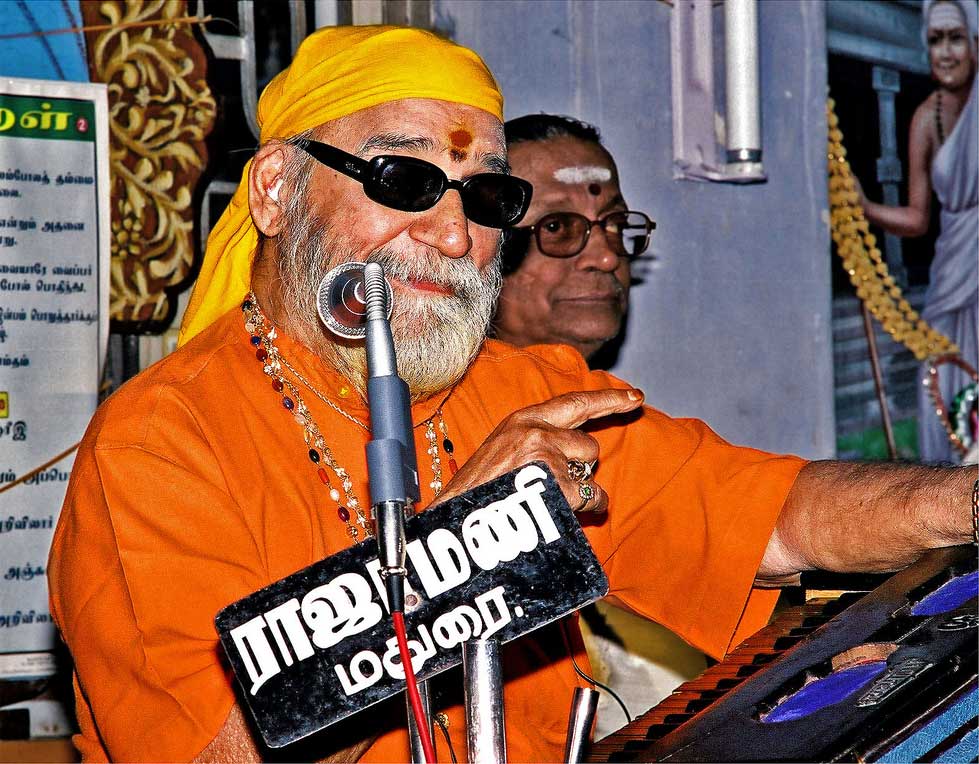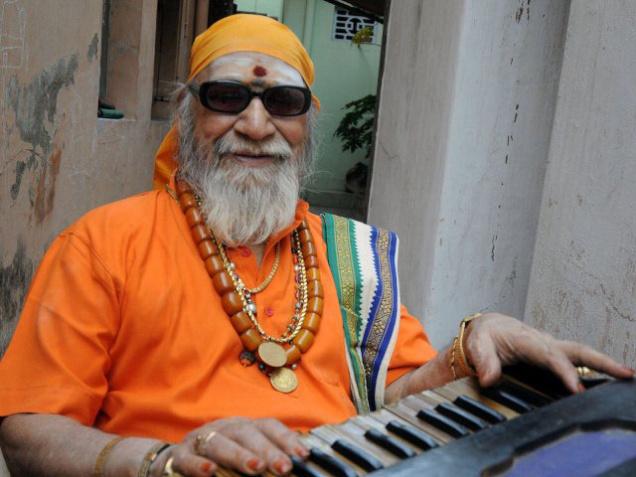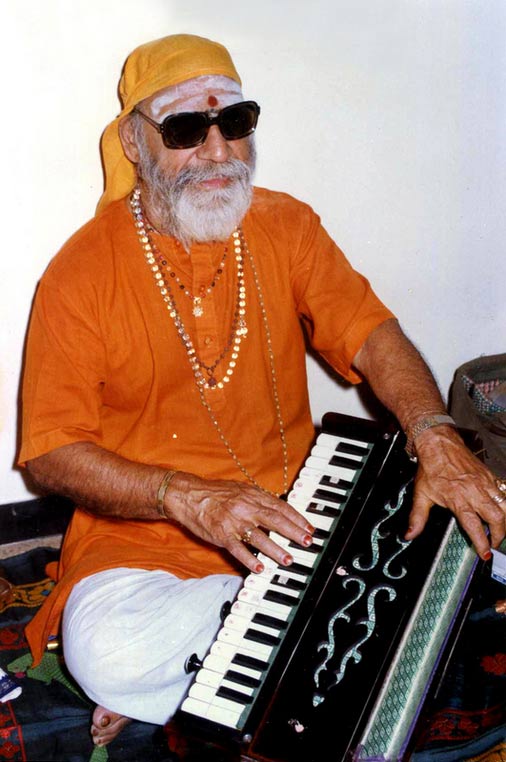
|
||||
|
| ||||
Singer Pithukuli Murugadas passes away
The Hindu of 17th November 2015by B. Kolappan(Chennai: 17 November 2015) Pithukuli Murugadas, the devotional singer aged 95, died here on Tuesday. Murugadas was a writer, lyricist and music composer too. The singer travelled extensively in the country and abroad and his songs on Krishna, particularly the compositions of Oothukadu Venkata Subbaiyer raised the bar for all other singers. Born at Coimbatore on January 25, 1920, in a Brahmin family, Murugadas (Balasubramanian) learnt bhajans from his grandfather Gopalakrishna Bagavathar. While participating in a freedom struggle in 1936, he was severely beaten up by police and lost vision in his left eye completely. Murugadas, who started his musical career in 1947, has written and composed thousands of devotional songs and performed in Singapore, Malaysia, Mauritius, Nepal, Sri Lanka, South Africa and the USA. Brahmananda Paradesiyar, a saint, named him “Pithukuli” (a spiritual person) and Swami Ramadas, head of Aanandashram in Kanjangad in Kerala, added the title Murugadas meaning the servant of Lord Muruga’ Be it Alaipayudhe Kanna or Aadadhu Asangadhu, his voice continues to find resonance with the public to this day. Murugadas was an expert in Tiruppugazh singing and cut a lot of records. He was known for his perfect pronunciation and diction. Murugadas has many awards to his credit including the Kalaimamani from the Tamil Nadu government and the Sangeet Natak Akademi award. Courtesy: The Hindu (Chennai) of November 17th 2015 Muruga Das - The Voice of Devotionby Sri. V.S. KrishnanThe dark glasses, the grey beard, a maroon shawl tied around the head, a prominent tilak’ on the forehead; that completes the picture of Balasubramanian, popularly known as “Muruga Das”. There is yet another important part of his personality, the harmonium, which accompanies him wherever he goes. Just as Karna was born with armour and earrings stuck to his body, it would appear that Murugadas and harmonium are the two inseparables. Even while climbing the footsteps of Marudha Malai, the annual ritual he was following for many years on his birthday, the harmonium used to be hung around his shoulders, adding concordant notes of music. Born with a deep, resonant and golden voice, Murugadas dedicated his life to sing the glory of Muruga. Wherever he does his concert, at Erode or Edinburg, he gets overwhelming response from devotees. Fans kept demanding to sing their favourite numbers on Muruga or Krishna and the servant of Muruga always obliged them with his characteristic smile. 
It was on a Thai Poosam’, the most auspicious day of Lord Muruga, in the year 1920, this disciple of Muruga was born to Alamelu Sundaram Iyer couple at Coimbatore. At the age of seven, when Balasubramanian was being led to the sanctum sanctorum at Palani, the articles for Puja offerings carried by the escort suddenly fell on him. Seeing the Balasubramaniam fully immersed in vibhuti (sacred ashes) the escort yelled: “Oh! Saravana Bhava”! That Sadakshara mantra, the young lad realised, was the message for him. That name, like a flash of lightening, brought him the realization that Muruga alone would give him fulfillment in life. Then on, singing the glory of Muruga became his life-long mission; the mission which he carried on with devotion and dedication. Gifted with a powerful voice, it was natural that he had chosen the medium of music in accomplishing his goal. He received basic lessons in music from Nadayogi Brahmananda Paradesiyar. This teacher then conferred him the title Pithukuli’. While staying with his sister at Bangalore he started rendering Kritis himself. The harmonium connection came now. He met saint Ramadas at the Kanhangad Ashram and received blessings from Him to carry forward his mission. It was Sri Ramadas who conferred him the title Muruga Das’, the Servant-Devotee of Muruga. He also received the blessings of Matha Krishnabhai at Bangalore. He set out his journey to visit holy places in search of enlightenment. He traveled extensively in India, visiting holy temples and hailing the glory of Muruga through his songs. Wherever he performed he received standing ovation. His journey took him to many places to Somnath in the north, Nepal in the east and Pandaripuram in the West and almost the entire stretch he covered by foot only. He considered this as a blessing because he could carry the message of Muruga all over the country. During the Digvijaya, he met and received blessings and inspirations from great saints and intellectuals like Sivananda, Swami Gjnanananda, Ramana Maharshi, Brahmananda Paradesiyar to mention a few. Though devotion is the foundation on which his personality was built, he committed himself to work for the national goal. That was the time when freedom was the need of the hour and moved by the ideals of Gandhiji, he joined the independence movement. The historic Avadi session of the Congress got started with a prayer by Murugadas. He wore only Khadi and invariably done songs of Subramania Bharati. When imprisoned for taking part in Sathyagraha at Mysore, one of his eyes, damaged during childhood, was lost. But he got his vision very clear, the enlightened vision of Lord Muruga. The meeting of Vallimalai Sri Sachidananda Swamigal was a turning point in his life. He stayed with Swamigal at Vallimalai for over one year. He drew enormous inspiration from Vallimalai Swamigal and considered him as his 'Thiruppugazh Guru' and carried the message of Thiruppugazh through music. A Muruga Das performance was never complete without few numbers from Thiruppugazh. The powerful Mantra of Thiruppugazh is melodiously blended in the voice of Murugadas. Sri Murugadas found common cause with Thiruppugazh Mani’, Sri T.M. Krishnaswamy Iyer, another Muruga devotee and exponent of Thiruppugazh. Both of them visited Ceylon number of times. Muruga devotees of Jaffna and other cities still cherish those melodious moments. He saw Thiruppugazh as the way to reach Muruga. In recognition of the contribution he made for the propagation of Thiruppugazh he has been conferred with titles like "Thiruppugazh Innisai Selver" "Thiruppugazh Isai Thenral" "Thiruppugazh Gjnana Jyothi" "Thiruppugazh Gana Isai Per Arignar" "Thiruppugazh Adiyar" and the list goes on. Sri Muruga Das has formed a distinct style of his own. His bhajans were always interspersed with commentaries. In the midst of a song, he would start explaining the meaning and as the message slowly sinks in, he would start again from where he left, giving the audience a treat both for the soul and intellect. Starting in a slow leisurely pace, his bhajan would gradually progress, creating a divine atmosphere and kindling the light of Bhakti in the mind of listeners. When his Namavali’ reached the crescendo, he used to invite the audience to join him. When the recital was over, he would have created an everlasting impression on the audience. When Erode District was caught in an extreme spell of draught in the 80s, he came and rendered a song invoking the rain God which received tremendous audience appreciation.
When it rains, the water level in the field rises and the nurseries leap up, The young plants grow up and so the paddy fields. As the vast stretch become greener, The face of poverty disappears. (“Konjam Mazhai Kodamma, Maariyamma, …Kalathuyara Neeruyarum, Neeruyara Nelluyarum, Nelluyara Varumai Neengum) Needless to say, three days later, a good part of the district was inundated with rainwater. When he started singing, the entire atmosphere was surcharged with devotion and the audience was transcended to a state of oneness with the God. He received the Kalai Mamani Award of the Tamil Nadu Government, Sangeet Natak Academy Award of the Government of India, for the sake of Honour Award of Rotary Club, title of Sangeerthan Samrat from Swamy Sivananda of Rishikesh, title of Sangeerthana Kala Sagaram from Bharathi Yuva Kendra, Madurai and the tittle of Madura Gana Mamani from London Tamil Sangam. He recently received Chandrasekarendra Saraswathi National Eminence Award instituted by South Indian Education Society and Shanmughananda Fine Arts Sangeetha Sabha, Mumbai. Above all, he felt that the title “Pithukuli” suited him most and preferred to retain it with his name. The word Pithukuli’ loosely translated means “one madly obsessed by bhakti. Murugadas took the message of Muruga to many foreign countries like UK, USA and France. He participated in the World Hindu Conference held at Durban and Nelson Mandela who was the Chief Guest highly appreciated his views and songs. He had many occasions to perform at Rastrapati Bhavan. He believed that service of humanity as part of devotion. One who has no concern towards his fellow being cannot be a true devotee. He founded the Valajabad Deenabandu Ashram and pioneered a movement for social awakening. This Institution has been working with the objectives of establishing inter-religious harmony and various social welfare activities. Wherever he was called to perform, he made only one request that the poor be fed. He believed that there is no greater satisfaction than feeding the hungry. The social welfare initiatives carried out by him through this Institution were greatly appreciated by Rajaji, Kamaraj, Kalki Krishnamurthy etc. When this writer asked him how he felt looking back the path he traveled, he said: “From the age of ten I have been singing the glory of Muruga. Wherever I performed, the audience, cutting across all barriers, joined the chorus. "As they listened to the glory of the Lord and engrossed in the singing, a sense of joy was visible in their face. I was happy that I was instrumental in bringing this smile on their face..” He continued: ”When a devotional song is heard, the notion of self’ disappears and one is able to identify himself with the God. I believe in equality of all religion and the need to cultivate the spirit of tolerance among different faiths. Only then peace will descend on earth". In the modern age when life has become hectic, according to Muruga Das, Bhakti Marga, the path of devotion is the easiest way to reach the God. Citing the example of Jaya Devar, Chaithanya and many such saints, who had dedicated their life to the singing of the glory of Lord, Muruga Das extols the modern day youth to spare few moments for Nama Sangeerthanam. Our mind normally gets accumulated with dusts like lust, anger, greed and ego and he believes that Nama Sangeerthanam helps one to transcend from this emotional level to a high level of consciousness. According to Muruga Das, one should develop an outlook of detachment from the material world. As one thinks high, he becomes free from likes and dislikes, passion and sentiment. “I did not try to own anything that I liked or I did not try to disown anything that I did not like. If we have complete faith in God, no harm can befall us”. He continued: “I have an unshakable faith in the Thiruppugazh lines. “While walking alone, I walk with confidence because to my left and to my right, in front and back, night and day, Muruga is there guiding me.” (Thanithu Vazhi Nadakkum Ena idathum Oru Valathum Iru Purathum Arukaduthu Iravu Pakal Thunai Akum, --Vel Vakuppu) Ponnammal Sisters are connoisseurs of music and arts. Murugadas married Saroja, the younger sister of them and the life boat of Muruga Das and the gifted artist Saroja was sailing smoothly. As years passed by, old age has set in. Though age has restricted his movements he continued his divine mission with determination. Then, the call came from Muruga. Muruga had sent him to earth with a mission to fulfill and mission having accomplished, Muruga desired on draw him near Him. It was on an auspicious day of Thaipusam, he was sent to earth and it was an auspicious day of Kanda Sashti that he attained the Lotus Feet of Muruga. Though the voice that captured the heart of all Muruga devotees became silent, there is no doubt that the voice had merged with Muruga. Now, when the time for departure came, he would have been feeling confident and courageous to face death because he knew that Muruga’s Vel would accompany him on his left, right and all sides to protect him. Though his voice has become still, it would reverberate in our ears for generations to come. Devotees would never forget the lively songs he rendered like Alaipayuthe’, Pachai Mayil Vahanane’. Article by Sri V.S. Krishnan (vsk1940@gmail.com) |

